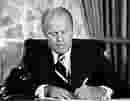Leading By Doing What is Right - Not What is Popular

One of the frustrations with the church today is that it is making itself over in the image of popular preference. Countless churches are designing their sanctuaries, revising their worship, and restructuring their governance, according to current trends determined by the most recent poll data.
Ergun Mehmet Caner, president of Falwell's Liberty Theological Seminary, wrote a refreshingly candid article on this topic with the straightforward title: "Polls are for Liberals: Churches must not lead by consensus or popularity" (National Liberty Journal, Feb. 2007). Especially poignant was his account of President Ford in the days leading up to his pardon of Nixon. He recounts how everyone was pushing to see Nixon brought up on charges. "Every poll taken indicated a vast majority of Americans wanted the former president on trial for the crimes of which he had been accused." Caner continues by noting that as the president contemplated the possibility of pardon, his own advisers were split. "They were sure that if he were to pardon Nixon, President Ford would lose the upcoming election. President Ford, on the other hand, saw the decision as one that would spare the country a scandal and a circus. His own political future was not his highest concern."
What Caner recounts next shows that leadership finds its essence not in testing the wind with a finger to determine where the winds of desire are blowing that day. It comes in doing what one author called "the hard right." "As one of his advisers spoke about the polls that indicated that Americans wanted a trial, the normally calm Ford sharply replied, 'I don't care what the polls say! I don't need polls to tell me what is right and wrong!'"
Caner then reminds his readers that "Evangelicals could learn quite a lesson from President Ford." I would add that Lutherans could learn such a lesson as well. As a pastor I know firsthand the temptation to make decisions based on what the fallout will be. No leader wants to be unpopular. No leader enjoys standing alone. Yet true leadership is the fortitude to put aside the inner need for emotional security and step out ahead of the group to do what is right, even if it comes with a personal price.
In the Missouri Synod we have not always rewarded such leadership; in fact we have punished it. We are also on the roller coaster of change these days as we try to determine, according to popular opinion, what the church should look like in the years to come. One of the hardest decisions I had to make as a pastor came when I stood before the church and its leadership and told them that I could not follow their desire to introduce contemporary worship. I did this twice in two different parishes, and both times it required me to do what I felt was right, even though I knew there would be great opposition. Actually, I wasn't sure if it might ultimately cost me my pastorate.
However, I discovered in those dark days of leadership that people will often be inspired to follow a leader and stand beside them in the fight, if they know he is completely committed to his cause. They do not appreciate waffling. I have seen laypeople risk their own positions along with me because the cause was right and they knew that I was not going to pull back when the heat of controversy became too uncomfortable.
This is what I still hope for in the church and especially in my own denomination. It is always tempting to ride the wave of change and see outward signs of temporary success (such as one might define it at the moment.) Regardless of what one might say of President Ford's decision, we have to admire his moral fortitude to take what he saw as the "harder right." I admire a leader who is willing to risk for the sake of what is right, not one who is always looking to the next election.
So, bravo Ford! May your example remind us in the church what we need to do. There is a right thing to do, and we must do it, whether that is in defending the church's biblical and historic worship, speaking out on the role of women, or cautioning overly enthusiastic pushes for ecumenical openness. May the Lord lift up such leaders for our time.



Comments